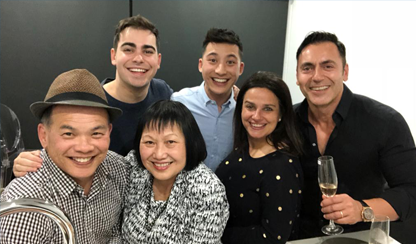
Cardiologist-researcher Joshua Wong has committed his working life to finding answers for, and supporting, patients who suffer a double blow — cancer and heart failure. With cancer survivorship growing, so too is the rate of those with heart failure post-chemotherapy. We go Fast Five with PhD candidate Josh to learn how early detection of heart failure might help cancer survivors beat the odds twice.
How did you end up doing your PhD at the Baker Institute?
I finished my Cardiology Advanced Training at Royal Melbourne Hospital in early 2023 and like all early-career cardiologists, I found myself at the crossroads of whether to start working immediately, pursue a clinical fellowship or embark on a brand-new journey of a PhD. It was a daunting prospect, but I was told that you never get this time again once you start full-time work as a cardiologist and where I had previously juggled working countless on-call shifts and after-hours research, in a PhD I could give research my total undivided attention and properly explore life as a clinician-researcher.
As to how I ended up across the river at the Baker Institute, well two words — Tom Marwick. His reputation preceded him, and now I understand why. If there was ever a supervisor you could trust to guide you through your PhD journey, it would be him. It was a bit serendipitous that I was looking for a PhD in heart failure and cardio-oncology and he had the perfect PhD project waiting to take flight.
What is the focus of your PhD and why were you drawn to cardio-oncology?
As cancer treatments continue to improve, more people are surviving cancer but the most common cause of mortality following cancer survivorship is heart disease. This is due to cardiotoxic effects of chemotherapy and risk factors common to cancer and heart disease. I call it ‘The Curse of Curing Cancer’. Heart failure is one of the most common cardiac presentations in cancer survivors and is more than twice as likely to occur in a cancer survivor than the general population. The good thing is that heart failure is detectable in its early stages and is preventable. My PhD aims to help this vulnerable high-risk group of cancer survivors by detecting and treating early-stage heart failure — stopping the cancer patient of today becoming the heart failure patient of tomorrow.
Cancer patients are already in the fight for their lives and when they see me it usually means their heart is now adding to their long list of overwhelming problems. Being able to provide some guidance and support in these unimaginable situations draws me to this area of cardio-oncology.
Do you have any insights into why so many cancer survivors present later in life with heart disease?
This area of research is a bit of an evidence-free zone but we think it’s probably a multi-hit phenomenon rather than one specific cause. We know that certain chemotherapies can be toxic to the heart. We also know that there are common risk factors for cancer and heart disease and cancer survivors are prone to premature ageing. These multiple hits over many decades can make an already vulnerable cancer-surviving heart tip into heart failure in their later years. Despite this knowledge, there’s still is no process for tracking or monitoring cancer survivors for the onset or development of heart failure. The trial I am currently running is called REDEEM. It seeks to clarify the utility for a heart failure screening program in adult cancer survivors and the benefits this can provide our patients.
Tell us something interesting about yourself.
I come from a highly blended family. My parents immigrated here from Malaysia and Thailand before I was born so all our relatives are back in Asia. This, however, is made up for by my husband’s massive Italian family. Though worlds apart, both our families are still equally as loud at the dinner table, and both show love with endless amounts of unnecessary food. However, the biggest similarity between Asian and Italian culture is that family means the world.
You have Malaysian/Thai heritage, and your husband is Italian, so what would be on your three-course menu if you hosted a dinner party, and who would attend?
Impossible question. Probably some weird fusion of yum-cha dumplings for entree, Nonna’s famous pasta pesto (or lasagna) as the main and gelati for dessert… with a side of bubble tea. I’d invite anyone who would eat this odd assortment of multicultural delicacies to come along.







